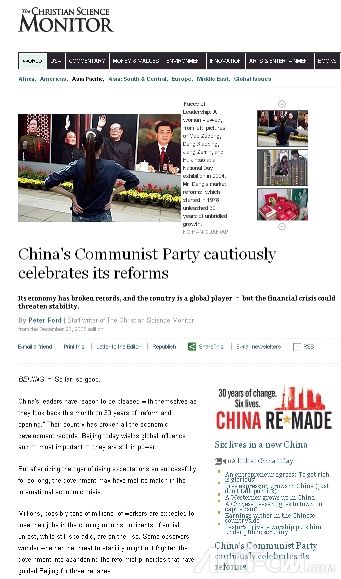【原文标题】China's Communist Party cautiously celebrates its reforms
【中文标题】中国共产党小心翼翼地庆祝改革
【登载媒体】基督教科学箴言报
【来源地址】http://www.csmonitor.com/2008/1218/p25s16-woap.html
【译者】荡漾
【声明】本翻译供Anti-CNN使用,转载请注明译者及出处,谢谢!
【说明】
 Peter Ford是《基督教科学箴言报》中国报道的“主要劳动力”,时逢中国改革开放30周年《基督教科学箴言报》于12月18日集中刊载了由Peter Ford撰写的系列报道共计8篇。 Peter Ford是《基督教科学箴言报》中国报道的“主要劳动力”,时逢中国改革开放30周年《基督教科学箴言报》于12月18日集中刊载了由Peter Ford撰写的系列报道共计8篇。
此文为该系列报道的末篇,另有6篇从六个不同的故事看改革开放给人们生活带来变化的系列报道:
·企业家认同“致富光荣”An entrepreneur agrees: 'To get rich is glorious'
·(只要不谈政治)中国的言论自由在进步Free expression grows in China (just don't talk politics)
·生长在中国的一个西方人A Westerner grows up in China
·一个中国农民走向资本主义化的城市A Chinese peasant goes to town on capitalism
·中国的农村收入微薄Earnings wither in the Chinese countryside
·牧师的个人信仰追求承受着社会监控Pastor's private worship puts him under public scrutiny
【译文】
中国的经济屡创纪录,成为一个全球竞争者,但金融危机可能危及社会稳定。
目前为止,一切还不错。
回顾30年来的“改革开放”中国领导人有理由为自己感到满意。中国打破了所有的经济发展纪录,现在具备了全球影响力,而更重要的是目前仍当红。
不过在长久成功骑着不断高涨的期望之虎后政府可能已在全球经济危机中遇到了自己的挑战。
预计未来数月内将有数百万甚至可能数千万的工人失业。而社会动乱事件尽管零星却呈上升趋势。有研究学者想知道政府是否不可能被社会稳定的威胁所吓到而选择放弃三十年来引领中国前进的改革原则。
长年住在中国的政治分析家Russell Leigh Moses认为“这是一个靠经济而非意识形态驱动和团结在一起的国家”“一旦经济出问题,那么改革的原因也就出了问题”。
执政共产党向来并不怯于宣扬所取得的成就,却在庆祝1978年12月诞生的改革开放30周年前夕表现出令人好奇的沉默。唯一一篇刊载于共产党喉舌的《人民日报》的文章相比于成就更为密切关注的是改革开放的缺憾——腐败、薄弱的社会保障体系和不断扩大的不平等。
然而社论将这些失利定义为“进程中出现的问题”,并未归咎于“改革的大方向”而是认定为“改革还未完成……开放水平还不高”的结果。
芝加哥大学的Dali Yang教授认为“今天不会有人争论是否该回到改革前的体制”“针对不平等状况的批评呼吁回归过去的价值观但人们仍然赞赏所取得的成就”。
“需要更多的改革。我看不出现在中国有什么理由想要停下来,即使今天政府的改革需要更多的商议而非简单地强令行动”。
Yang教授预计未来数月“对中国领导人而言极具挑战性”。他认为实际上挑战可能加快改革的进程,因为政府要努力使国家和政党本身驾驶的是一艘平稳的船。
他预测低迷的出口很可能促使中国重新思考一直采取的重出口增长模式,而不断上升的失业将迫使当局最终开始建设社会保障体系。
“过去30年来只有在压力下中国领导人才会作出重大的变革”“现在他们就身处压力之中”。
然而中国政府一如既往决定拒绝在压力下作出改变的是上周重新开始出现的呼吁——要求中国的政治自由应该与新的经济自由相匹配。
为纪念人权世界宣言60周年由300多位知识分子等人签名的一份民主请愿书《08宪章》受到了警方的“关照”,几个作者被逮捕。
迈阿密大学的政治学教授June Teufel Dreyer认为“中国已发展成稳定的独裁主义”“会有起伏,但我不认为中国会转变为自由民主的社会,也不会在不久的未来陷入分裂”。
“共产党人成功地限制了其他党派并让普通中国人深信即使他们不喜欢共产党,考虑到一旦共产党被推翻随之而来的黑暗混乱共产党依然是更好的选择”。
《08宪章》的签名者们在其通过互联网发布的公开信上提出疑问中国是“继续独裁统治下的‘现代化建设’”还是“拥抱人类的普世价值”。但很少有研究观察中国的学者认为在当前紧张的经济和社会发展局势下中国政府会试验更大的政治自由。
北京理工大学教授、互联网辩论家胡星斗认为“如果想要建设一个现代化的文明国家最终中国的自身价值势必要与诸如民主、法治和人权的普世价值接轨……”“这是政府唯一能选择的道路”。
他还表示“我觉得国家的发展前景短时间内尚不明确。但从长期看我很有信心”。
系列报道的首篇请参阅 http://bbs.m4.cn/thread-126643-1-1.html
【原文】
(by Peter Ford)
Its economy has broken records, and the country is a global player – but the financial crisis could threaten stability.
BEIJING – So far, so good.
China's leaders have reason to be pleased with themselves as they look back this month on 30 years of "reform and opening." Their country has broken all the economic development records, Beijing today wields global influence, and – most important – they are still in power.
But after riding the tiger of rising expectations so successfully for so long, the government may have met its match in the international economic crisis.
Millions, possibly tens of millions, of workers are expected to lose their jobs in the coming months. Incidents of social unrest, while still sporadic, are on the rise. Some observers wonder whether the threat to stability might not frighten the government into abandoning the reformist principles that have guided Beijing for three decades.
"This is a country united and driven by economics, not by ideology," says Russell Leigh Moses, a Beijing-based political analyst. "If the economy fails, so do the reasons for reform."
The ruling Communist Party, rarely shy to trumpet its achievements, was curiously muted in the run-up to the 30th anniversary of the meeting that gave birth to "reform and opening" in December 1978. The only article published by the party mouthpiece, the People's Daily, focused more closely on the policy's shortcomings – the corruption, weak social services, and widening inequality it has engendered – than on its triumphs.
The editorial called those failings "problems of progress," however, and blamed them not on "the direction of reform" but on the fact that "reform is not complete ... and the level of opening is not high."
"Nobody would argue for a return to the old system today," says Dali Yang, professor of politics at the University of Chicago. "Critics of inequality hark back to older values, but people still appreciate what has been achieved.
"More reform is needed, and I don't see why China would want to stop now, even if the government has to negotiate reforms more today, rather than simply impose them," he adds.
The coming months, which Professor Yang says he expects to be "pretty challenging for the Chinese leadership," could actually speed up reform, he suggests, as the government battles to keep the country, and itself, on an even keel.
Slumping exports will likely prompt a rethink of the export-heavy growth model that China has adopted, he predicts, and rising unemployment will force the authorities to finally start working on a social security system.
"For the last 30 years, China's leaders have pursued significant reforms only when they have been under pressure to do so," Yang says. "Now they are under pressure."
One set of pressures that the government seems as determined as ever to resist, however, are calls – renewed last week – to match China's new economic freedoms with political liberties.
The police greeted publication of "Charter 08," a petition for democracy signed by more than 300 intellectuals and others to mark the 60th anniversary of the Universal Declaration of Human Rights, by arresting several of its authors.
"China has evolved into stable authoritarianism," says June Teufel Dreyer, a politics professor at the University of Miami. "There will be ups and downs, but I don't expect it either to turn into a liberal democracy or to fall apart in the near future.
"The Communists have successfully suppressed all alternative groups and convinced ordinary Chinese that even if they don't like them, they are preferable to the dismal chaos that would ensue if they were overthrown," Professor Dreyer adds.
Charter 08 signatories wondered in their open letter, posted on the Internet, whether China will "continue with 'modernization' under authoritarian rule" or "embrace universal human values." But few Chinese observers expect the government to experiment with greater political freedoms at a time of social and economic tension.
"Eventually China has to combine her own values with universal values such as democracy, the rule of law, and human rights ... if she wants to establish a modern and civilized country," insists Hu Xingdou, an Internet polemicist who teaches economics at the Beijing Institute of Technology. "It is the only path the government can take."
"In the short term," he adds, "I am uncertain and ambiguous about the future. In the long term, though, I have strong confidence in this country."
【截图】

[ 本帖最后由 荡漾 于 2008-12-19 18:49 编辑 ] |